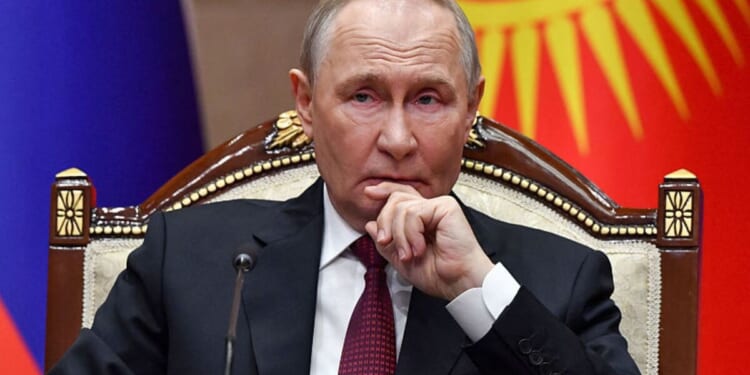From the moment Russian tanks crossed the Ukrainian border and set their course for Kyiv, the United Kingdom has stood firmly alongside its allies in defence of a democratic nation under assault. Governments have changed, world leaders have come and gone and new crises have emerged – yet the core message from London has remained constant.
Ukraine’s sovereignty is non-negotiable. And crucially, the British public has been just as resolute. Blue-and-yellow flags still hang from town halls and front-room windows. Polls consistently show extraordinarily high approval for President Zelenskyy – numbers any Western leader would envy.
But today, Zelenskyy needs more than sympathetic words, symbolic gestures or expressions of admiration. Ukraine may now be entering the decisive phase of this terrible war – and alarmingly, the decisive phase may not arrive on terms that reflect Ukraine’s status as the clear victim of unprovoked aggression.
The combination of battlefield exhaustion, a more fractious international environment, Russian disinformation and American impatience has created a treacherous moment. This is precisely the point at which allies must not blink.
Zelenskyy is, without exaggeration, one of the defining wartime leaders of our era. When Western capitals quietly offered him evacuation in February 2022, he refused, choosing instead to stand shoulder to shoulder alongside his Chief of Staff and closest Ministers as Kyiv came under siege.
The world remembers his words: “I need ammunition, not a ride”. This captured a rare combination of courage, clarity and moral purpose. Since then, he has carried himself with dignity across the globe, relentlessly touring parliaments and summits to ensure Ukraine’s cause does not slip from the West’s conscience as fatigue deepens and attention drifts.
What is less often appreciated is how Zelenskyy continues to lead today: directing operations under the constant threat of Russian missiles, sustaining morale on the home front, and relying on trusted advisers – most notably Andriy Yermak – to ensure Ukraine has a powerful voice in shaping any future peace settlement.
At many moments over the last three and a half years, Zelenskyy and his tight circle have been the only barrier between Ukraine and complete subjugation.
That is precisely why Moscow has made the end of his presidency one of its central demands. Putin understands full well that removing Zelenskyy and the current Ukrainian political leadership is the surest path to a pliable successor – and his long record of meddling in foreign elections speaks for itself.
Given Donald Trump’s complicated history with Zelenskyy and Ukraine, it is obvious why Russia believes now is the moment to turn up the pressure. Removing the Ukrainian President has become a key objective in Moscow’s maximalist ambitions for the region. It simply cannot be allowed to happen.
Britain, therefore, faces a choice. Do we congratulate ourselves for years of steadfast support, conclude that we have done our bit, and step back? Or do we recognise that Ukraine stands at its most perilous juncture yet – and that our responsibility is not fading, but deepening?
Our ally needs more than warm words as he confronts Russian aggression abroad, rampant misinformation online, and wavering conviction in the West. Zelenskyy needs to know that any peace settlement the UK and its partners will countenance must secure Ukrainian sovereignty and block Putin from regrouping only to strike again when his war machine has been replenished.
Ukraine cannot be forced into a settlement designed merely to pause the violence today but invite even greater violence tomorrow.
We should also acknowledge honestly why Britain is standing – why we must stand – by Zelenskyy, his government and his people. Morally, the case could not be clearer.
A democratic European nation was invaded without cause by an authoritarian neighbour bent on erasing its identity. Supporting Ukraine is the right thing to do.
But morality is only part of the story. There is also simple strategic self-interest. Russian warships have been spotted in the English Channel. Moscow has repeatedly probed our defences and targeted our information space.
If Putin is permitted to dismember, digest and ultimately destroy Ukraine, anyone who believes his appetite would end there is deluding themselves. The Baltics, Poland, Moldova and beyond remain firmly in his sights. A victorious Putin would be emboldened; a defeated Ukraine would send a chilling message about the West’s resolve.
European governments are beginning to grasp the scale of the threat – but too slowly, and in many cases too reluctantly. The UK has often been a leader, but leadership must be reaffirmed, not assumed. The reality is stark: Kyiv is the front line of a conflict in which Russia is not a distant geopolitical concern but a direct and growing adversary.
Ukraine’s political leadership are ‘our men’ on the front line. If we fail them now, we fail our own long-term security. Ukraine may be nearing the end of a brutal phase of the war, but it is embarking on an even more daunting journey.
Rebuilding a shattered nation, caring for tens of thousands of traumatised children and families, restoring infrastructure, reforming institutions, securing investment, and ensuring that any peace settlement does not come at the cost of future safety or prosperity – this will be the work of decades.
Given the malign ambitions of the Kremlin, the task is even more complex. Yet it is essential, and Ukraine cannot do it alone. The most dangerous point in any conflict is often the moment when the guns fall quiet.
The temptation – for allies, publics and politicians – is to move on. But that is the moment when authoritarians exploit fatigue and division. It is the moment when democratic leaders face pressure to take the path of least resistance.
And it is the moment when those who stood bravely at the front risk being left dangerously exposed. We cannot allow support for Ukraine, or for President Zelenskyy, to drift. Not if we value democratic sovereignty. Not if we value European security. And not if we value our own.
This may be the endgame – but not the end of responsibility. Britain must continue to stand with Zelenskyy and Ukraine not just until the killing stops, but until a just peace is secured and a stable future is built.

















